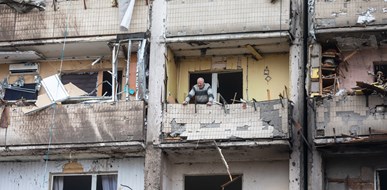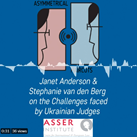[Conference] Strengthening Ukraine’s national efforts to investigate, prosecute, adjudicate and report on international crimes
Published 11 November 2022
Kiyv, Ukraine.
On Monday 14 November, the Asser Institute and Global Rights Compliance (GRC) co-organised the conference ‘Strengthening Ukraine’s national efforts to investigate, prosecute, adjudicate and report on international crimes’. The conference - which was fully booked - brought together high-level (inter)national experts, from Ukraine and elsewhere, to assist Ukrainian national authorities in dealing with the ever-increasing international crimes they are confronted with.
The conference was part of the MATRA-Ukraine project, funded by the Netherlands’ Ministry of Foreign Affairs, which began in 2020. The project aims to strengthen Ukrainian efforts to investigate, prosecute, adjudicate and report on international crimes.
Effective investigations
During the conference, (inter) national experts listened to Ukrainian perspectives, identified main challenges and shared ideas and insights on how the Ukrainian national authorities could proceed in dealing with international crimes. Relevant questions included: is the legal framework in place sufficient in terms of international crimes? What assistance do the Ukrainian Office of the Prosecutor General and the Ukrainian investigative agencies need to conduct effective investigations and prosecutions? What is the role of civil society organisations (CSOs) in this context? Why is the critical monitoring of trials by academics, lawyers and journalists important? How should the judiciary in Ukraine be structured and resourced in order to hear international crimes cases? What form (if any) should international assistance to Ukrainian national authorities take?
Podcast upcoming
International justice podcast makers Asymmetrical Haircuts spoke to the delegation of Ukrainian judges about out how they are coping with the immense scale of war crimes that need to be processed. If you don't want to miss the podcast, sign up for our newsletter to receive an update when it is released.
Programme & speakers
Opening remarks
10:45 Welcome by Christophe Paulussen (Asser Institute) & Ruby Axelson (GRC)
10:50 Welcome by Myroslava Krasnoborova (Counsellor of the Ukrainian Embassy in The Hague)
10:55 Welcome by Mauritz Verheijden (Ministry of Foreign Affairs of the Netherlands)
Session 1: Strengthening and coordinating investigations and prosecutions
11:00-12:30 Panel Discussion (moderated by Victoria Kerr, Asser Institute), followed by Q&A with the audience (in The Hague and online).
- MP Oleksandr Bakumov (Chairman of the Temporary Special Commission of the Verkhovna Rada of Ukraine on international humanitarian and international criminal law in the context of the armed aggression of the Russian Federation against Ukraine) (in person) – on the legislative landscape related to international crimes
- Zera Kozlieva (War Crimes Unit of the Office of the Prosecutor General) (online) – on the developments since 2014 in terms of investigations and prosecutions
- Wayne Jordash KC (GRC) (online) – on the work of the ACA/MJTs, navigating offers of assistance and coordination with international efforts
- Oleksandra Matviichuk (Center for Civil Liberties) (online) – on the work of CSOs in terms of documentation and cooperation between civil society and the investigating and prosecutorial authorities
- Dmytro Koval (Truth Hounds) (online) – on the work of CSOs in documentation
- Alix Vuillemin (Women’s Initiatives for Gender Justice) (in person) – on the importance of CRSV investigations and prosecutions
Session 2: Strengthening the judicial capacity to adjudicate international crimes
13:30 – 15:00 Panel Discussion (moderated by Marta Bo, Asser Institute) followed by Q&A with the audience (in The Hague and online).
- Svitlana Yakovlieva (The Supreme Court of Ukraine, Criminal Cassation Court) (in person) – on her personal experiences in terms of international crimes cases
- Hanna Maina (The Novomoskovskyi Court of Dnipropetrovsk region) (in person) – on her personal experiences in terms of international crimes cases
- David Vaughn (USAID Justice for All Activity) (in person) – on USAID support to Ukrainian judiciary in adjudicating war crimes at domestic courts
- Christine van den Wyngaert (Kosovo Specialist Chambers) (in person) – on her personal experiences and good practices in adjudicating international crimes
- Sergey Vasiliev (University of Amsterdam) (in person) – on the different accountability options
Session 3: Enhancing the fairness of the justice process
15:30 – 17:00 Panel Discussion (moderated by Ruby Axelson, GRC) followed by Q&A with the audience (in The Hague and online).
- Kateryna Busol (National University of Kyiv-Mohyla Academy) (in person) – on victims’ perspectives and reparations
- Marie O’Leary (International criminal lawyer) (in person) – on defence issues in international crimes cases
- Gaiane Nuridzhanian (National University of Kyiv-Mohyla Academy in Ukraine and UiT-Arctic University of Norway) (in person) – on fair trial issues
- Iryna Saliy (Court Reporter) (online) – on trial monitoring/reporting on international crimes cases
.
Did not make the conference and don't want to miss the podcast on this event? Sign up here for our newsletter to receive an update when it is released.
About the MATRA-Ukraine project
The conference is part of the Asser Institute and Global Rights Compliance (GRC)’s partnered MATRA-Ukraine project, which started in 2020. The MATRA-Ukraine project was set up to assist Ukrainian authorities in dealing with international crime and is funded by the Netherlands’ Ministry of Foreign Affairs. Read more.

